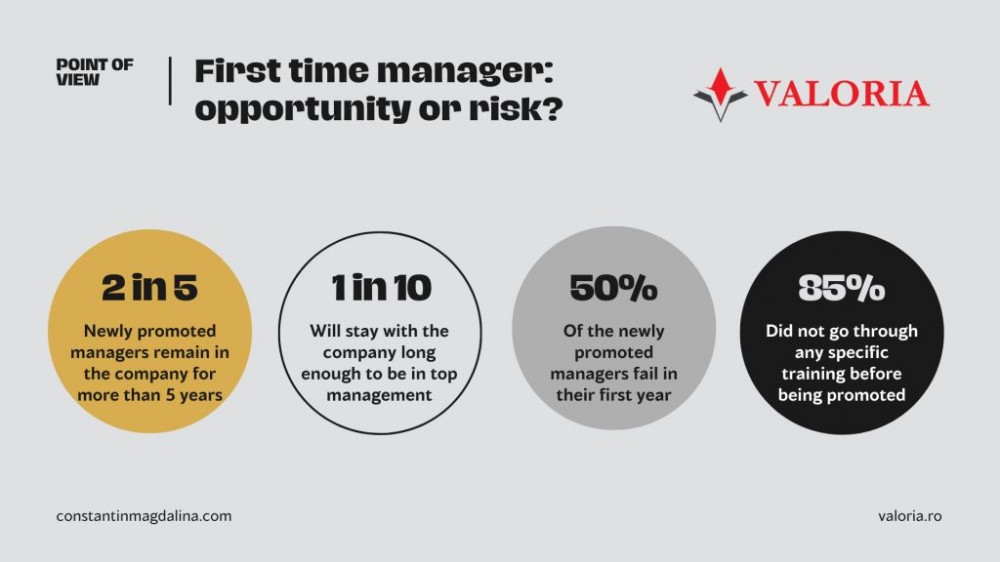When companies decide to promote specialists to the role of manager, they are actually deciding their future. It's a strong statement that could be considered excessive but this is what the statistics show: only 2 out of 5 recently-promoted managers will stay over 5 years with the company, and only 1 out of 10 will get to be in the top management of that company. But before they leave, first-time managers have to overcome the challenges of the beginning.

At the beginning of their professional career, many people want to be managers, and when they become managers, they start to breathe hard. These people don't know what to do the first. They don't seem to be in control of their time anymore, and they don't know how to manage their relationship with their colleagues or all the stakeholders. The role no longer has that shiny halo.
Guiding these managers into their new role is essential. Hard skills or soft skills training, mentoring, and coaching play an essential role in the success of a newly-promoted manager. Without these, the path of professional growth in management is very difficult: 50% of new managers fail in the first year.
The truth is that half of the first-time managers fail because they are unprepared and untrained: 85% of new managers did not go through any specific training before being promoted.
They are simply unprepared for the pros and cons of managing other colleagues and are either too attached or too cold to them. Good intentions are not enough. New managers must go through a training period.
Managerial training courses might seem meaningless to proponents of on-the-job training. On the other hand, organizations spend more resources on teaching managers how to use computers effectively than on training them to manage people. And the results are predictable: 79% of employees don't feel their performance is managed in a way that motivates them to do outstanding work.
For the management of the company, the greatest attention is on the results, and the most important people are those managing the teams. They are the ones who report to the strategic decision-makers. Therefore, the chain of command transfers not only responsibilities but also authority, which correlates hierarchically.
This is why new managers often receive less attention from management: 59% of first-time managers say they don't feel supported in their new role. First-time managers are often so focused on their own performance that they forget to think about the people who work with them.
The learning curve of being a first-time manager is steep but manageable. First-time managers can manage the team effectively and at the same time focus on the impact of personal performance on the team if they focus on a few key areas:
1. Departmental interdependencies – the stakeholders interested in the manager's activity mapped on the company's organizational chart
2. Inputs and outputs on which team performance depends – anything entering the team's work point from internal and external sources that the team's work transforms and the time, energy and budget resources invested
3. Building trust at the team level – expertise, predictability, consistency, honesty, care for others
4. Setting the 4-5 key indicators with an impact on the 20% of activities that generate 80% of the results
5. Monitoring results
In conclusion
Companies that commit to growing managers and building a harmonious organizational culture are simply more successful. This process can never happen by accident or without work. It takes decision and focus at the top management level, which is transferred to the middle management, down to those who report to them and so on.
Leadership is a collection of educated and trained skills, not a talent or gift. Every new manager who engages in this process can become a good manager. Great companies are made up of great managers. It depends on how much the companies will invest in the training and development of the new managers to guide them to the best results.
About Constantin Magdalina
Constantin Magdalina has 15 years of working experience, while he performed in multinationals both in Romania and abroad. Constantin has a master’s degree in Marketing and Business Communication from the Academy of Economic Studies in Bucharest. He is certified in Lean Six Sigma and ITIL, which gives him a good understanding of organizational processes and transformations. The Chartered Institute of Marketing certification further complemented his expertise and knowledge in business. In those over 4 years of working activity in a Big4 company, he initiated and conducted studies that analyzed different aspects related to the business environment in Romania such as the economic growth predictions of companies in 2013-2016, knowledge management, the buying experience in the age of digital consumers, social media 2013-2015, the utilization of mobile devices in Romania. He is the author of numerous articles on innovation, the efficiency of business processes, social media, the consumers’ buying experience in the digital age, trends, and emergent technologies. He is invited as a speaker at numerous events and business conferences.


































